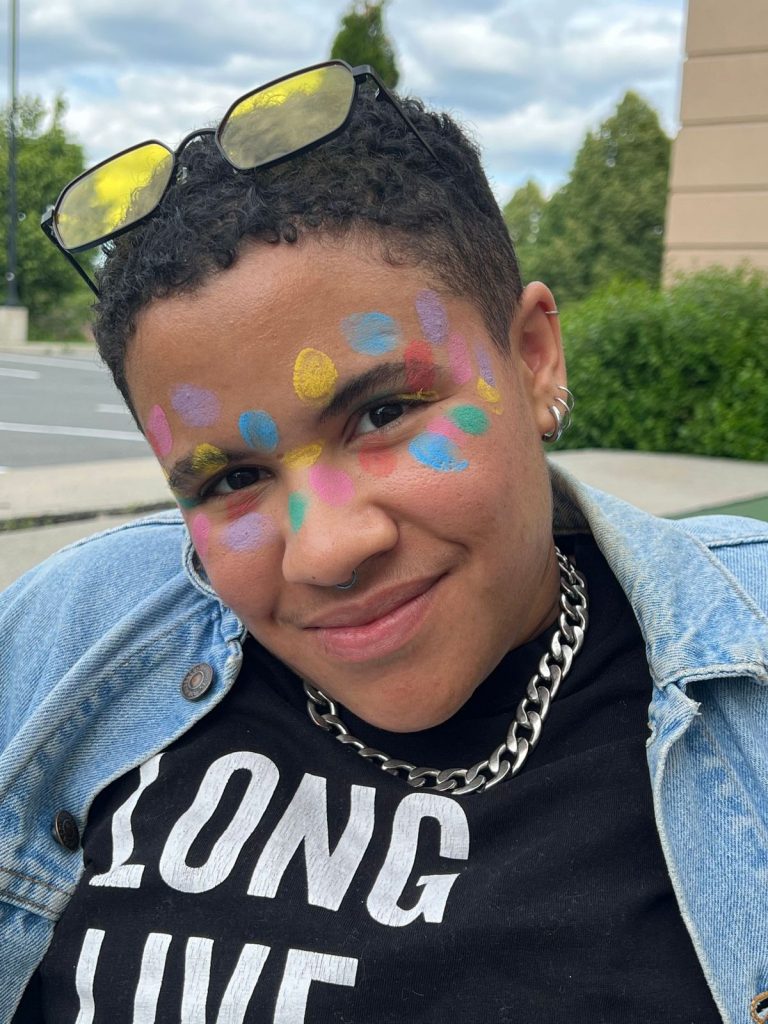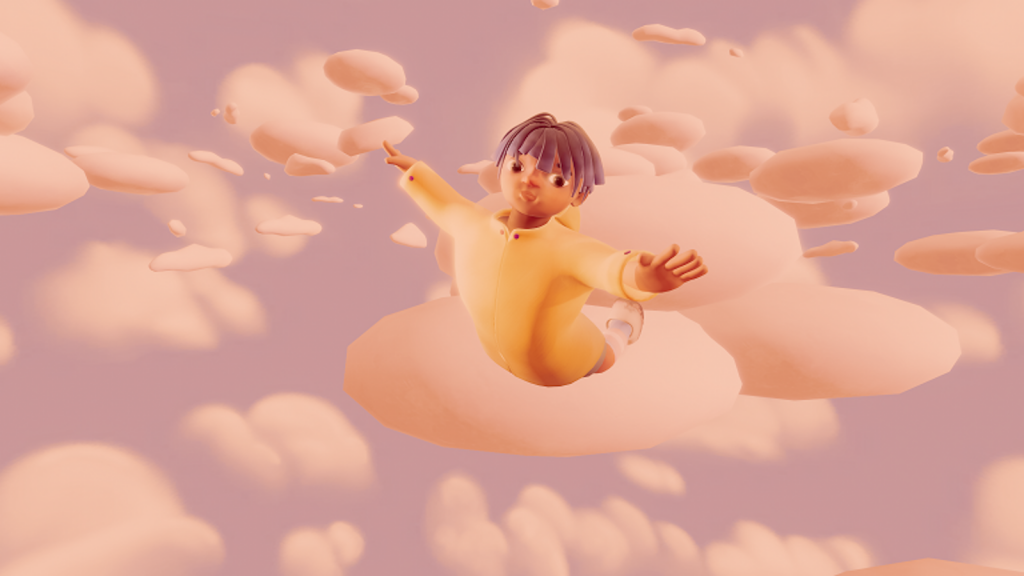KINDRED, the animated virtual reality story of the UK’s first openly non-binary parent to adopt a child, made its debut at the Venice Film Festival in September, so we got in touch with star Ki Griffin who plays lead role, Syd, to learn more about the project. Perhaps best known for their role as Ripley Lennox in Hollyoaks, marking the first non-binary character in any UK soap, we talked with Ki about representation, Black History Month, family, and trusting your gut.
Can you tell us a bit more about the story told in KINDRED?
Initially, when I was presented with the project I was like, it’s a non-binary character in a non-binary story, but as I learnt more from Bambou (the writer and director) I found that it’s more a story about how gender identity effects family dynamics and also how people navigate the adoption system. Syd, our main character, really delves into their experience and their ability to become a parent and I think that’s really the story that’s being told here. Family dynamics can be anything that someone constitutes to family, and I think that’s a really beautiful idea. The fact that this is a real story talking about someone’s real life really demonstrates what family can look like to different people.

The film is formatted as an immersive virtual reality experience, what do you think that provided to this story in particular?
We could have easily told this story in any other way but to be able to put someone in the position of Syd really helps to explore the emotional aspects of what they’re going through. It also creates relatability especially for people who are cisgendered, as it allows them to step into the non-binary experience which many – I assume – have never done before.
What’s the initial reaction been like so far?
Honestly bigger than I had anticipated. It all felt very small scale and intimate when we were working on it and then to see the reaction that we got from at Venice film festival has been insane. I find such joy in this story and to see that other people have seen the joy and the hardship and the different levels and layers to this story and are really relating to it, it’s honestly shocked me, and I like it when the world shocks me in this way.
What is your definition of family and has working on this project changed that perception at all?
I think this project really changed my perception of queerness and gender diversity in relation to family. As a person who doesn’t necessarily want to be a parent, I thought it was going to be harder for me to step into the shoes of someone who really did. A lot of my family is chosen and for a lot of my queer friends (who are of all ages) I do act like a parental figure, so I realised that maybe it’s not that I don’t want to be a parent, it’s just I already am to some people in my life, and I didn’t realise it until I was on this project. Reading through the script, I got a new understanding for Syd and for why they would want to help someone who is possibly going to identify as queer or gender diverse in the future. I completely understand wanting to be there for them and be a guide for them and I realised that parenthood is actually something a lot of people in the queer community do without realising. I think it’s really beautiful that we’re able to use this story to not only portray that but portray legal parenthood and terms of adoption status.
You’ve mentioned before that parenthood is pushed to the back of your mind due to the fact there’s not much representation in the media, do you think this passive discouragement extended to your career as well?
Oh, for sure. For so much of my entire life as a queer person, as a gender diverse person, as an intersex person I was told passively through society that I wasn’t meant to have the things that a lot of people have in their life which honestly boil down to just love and family and connection. I find Syd to be such an inspiring character and I think a part of me wants to be that for other people but also, I’m so glad that I’ve got that within my work. I think I’ve always had that sense of disconnection from the things that I wanted in life and to now be in a position where I have a loving family dynamic with my partner and cats and my close queer friendships and to also be in a career where I get to portray these really amazing people and provide that representation authentically is something I never thought I would be doing. I never thought I would be sitting doing an interview like this, but you get here and you’re like ‘Oh, the world maybe isn’t so bad.’

This is a film of firsts in that it’s about the first openly non-binary parent to successfully adopt in the UK and of course staring you, who is the first non-binary character to appear in a soap did you feel a connection with your character due to this?
It’s always funny because I don’t really internalise the idea that I’ve done first of anything. I think that I felt a massive connection to Syd because I understood the feeling of embarking on a journey that no one has done before. I could feel the fear but not like a scary thing it’s an anxiety more than a fear, it’s…
…Like an anticipation?
Exactly, and realising that you can either let it consume you as anxiety or you can let it push you as anticipation. I think in getting to be the voice of Syd I realised that I’ve actually used it as anticipation and used it to push myself. I think this is one of the projects I’m most proud of so far in my career and its really beautiful to be able to relate to the story. Syd’s personal experience makes me think that there are other people out there doing firsts and this would hopefully bring some comfort to them knowing that they can turn their anxiety into anticipation.
On the topic of your first, was there a lot of pressure to be that first non-binary representation in soap?
Well, I went from being a 21-year-old DJ who was in uni, to being on a film set every other day shooting a show – it was bizarre, in the best way. I think the biggest thing though, is that while a lot of people would maybe be happy with just doing the first thing, I’m just ready to do and see more of it. I think that’s the thing, we’ve broken the glass ceiling, so now let’s all run through it. Where are the others? Let’s bring them along.
You said that you find the character of Syd quite inspiring. What was the most important thing that you think that you’ve learnt from them?
I don’t think this is going to be the thing that most people take from it, but I think it’s taught me that although a thought or a feeling can be really spontaneous and sudden, it doesn’t mean you shouldn’t follow it. I’m a person who is very emotionally led in my life and I’ve often not trusted these gut feelings. I think that one thing that has inspired me about Syd is that they felt this thing and they went with it.
I suppose just because its sudden it’s not necessarily going to be fleeting.
I think it’s really important that we value those really randomly intense feelings. It’s ok to give them weight, it’s ok to give them the space to grow. I think that was one of the most inspiring things to me and it’s something that I’ve tried to continue to implement following this project. I’m trying to follow my gut more, but I feel like it’s not the thing most people will take away.
Perhaps not but that just demonstrates how everyone will take different things from it.
There are so many layers to this piece, I feel like it will really speak to every viewer very differently and I think that’s a really amazing thing that Bambou has created here, as well as the animation team.
What makes Black History Month important to you?
That’s a fun question! I think as a person of mixed heritage I really struggled for a lot of my life to claim my Blackness – there was always a certain in betweenness, but with my mum being Black Caribbean, there is so much Black influence and Black Caribbean joy in my household that I can’t believe that I didn’t accept that as part of me a very long time ago, so whenever Black History Month comes around, I always try to put my heart and soul into the fact that my Blackness is a beautiful part of me and I’m allowed to claim it. For me it’s a lot about wanting to honour the people that made my Blackness a beautiful thing rather than a thing to be feared or repressed those are people I want to pay tribute to during Black History Month, and I try to do that with all my small actions and that’s what makes it so important.

